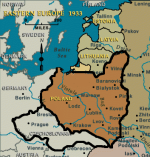Visigoethe
lefty lurker
- Pronouns
- he/him
Something I’ve always wondered about and never really seen any attempts at fleshing out outside of one embarrassing Turtledove project.
Let’s say that negotiations break down during the Munich crisis and Hitler initiatives Fall Grün on its planned date of October 1st, 1938. For various reasons: Czechoslovakia being harder to crack than Poland, a more hostile Soviet Union not trading with Germany, and a failed invasion of France, the German war machine sputters out in 1940 and Allied troops are crossing the Rhine by 1941.
What are the implications for the world going to be after? My first immediate question is what the peace and terms for Germany look like, but I’m very interested in any of the potential long-term consequences. Decolonization and the place of Britain and France as great powers, the fate of the USSR, America’s standing in the world, the result of Japan’s ongoing war with China and the international community’s response, the future of the League of Nations, Zionism as a viable political movement, Eastern Europe without Soviet occupation, etc.
If people know of any works that touch on a 1938 war or the idea of an earlier Allied victory I’d love to see them. Even if it’s just a one-shot, map, or PM list!
Let’s say that negotiations break down during the Munich crisis and Hitler initiatives Fall Grün on its planned date of October 1st, 1938. For various reasons: Czechoslovakia being harder to crack than Poland, a more hostile Soviet Union not trading with Germany, and a failed invasion of France, the German war machine sputters out in 1940 and Allied troops are crossing the Rhine by 1941.
What are the implications for the world going to be after? My first immediate question is what the peace and terms for Germany look like, but I’m very interested in any of the potential long-term consequences. Decolonization and the place of Britain and France as great powers, the fate of the USSR, America’s standing in the world, the result of Japan’s ongoing war with China and the international community’s response, the future of the League of Nations, Zionism as a viable political movement, Eastern Europe without Soviet occupation, etc.
If people know of any works that touch on a 1938 war or the idea of an earlier Allied victory I’d love to see them. Even if it’s just a one-shot, map, or PM list!


